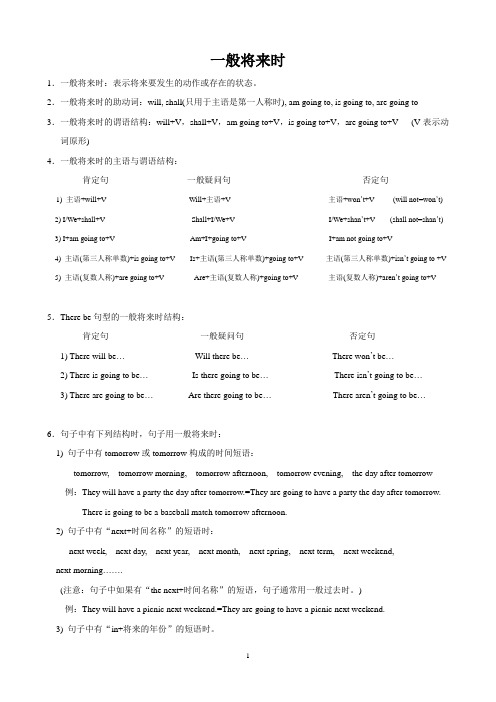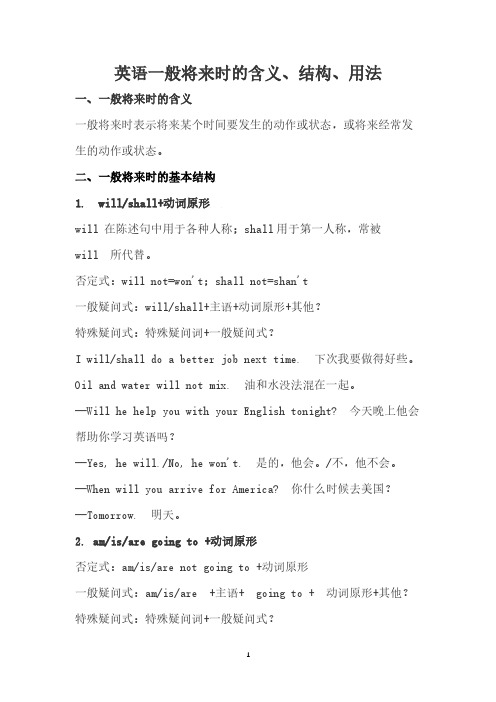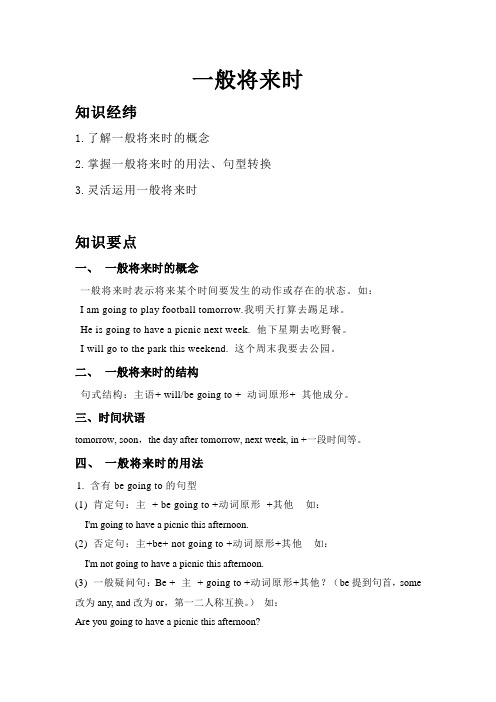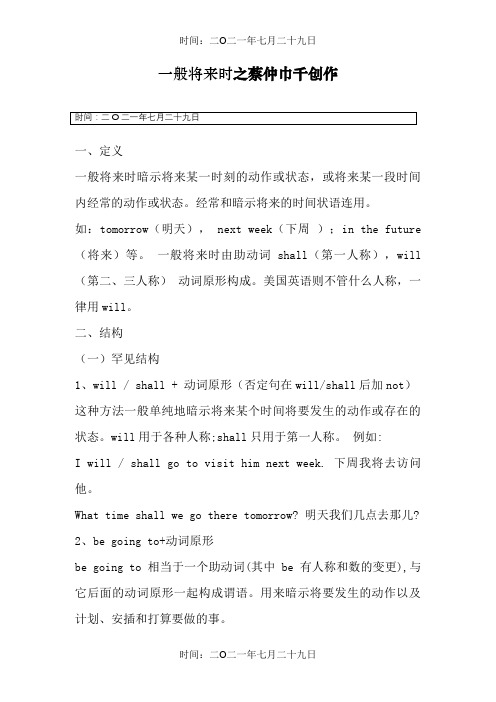-一般将来时的结构与用法
一般将来时用法总结

一般将来时1.一般将来时:表示将来要发生的动作或存在的状态。
2.一般将来时的助动词:will, shall(只用于主语是第一人称时), am going to, is going to, are going to3.一般将来时的谓语结构:will+V,shall+V,am going to+V,is going to+V,are going to+V (V表示动词原形)4.一般将来时的主语与谓语结构:肯定句一般疑问句否定句1) 主语+will+V Will+主语+V 主语+won’t+V (will not=won’t)2) I/We+shall+V Shall+I/We+V I/We+shan’t+V (shall not=shan’t)3) I+am going to+V Am+I+going to+V I+am not going to+V4) 主语(第三人称单数)+is going to+V Is+主语(第三人称单数)+going to+V 主语(第三人称单数)+isn’t going to +V5) 主语(复数人称)+are going to+V Are+主语(复数人称)+going to+V 主语(复数人称)+aren’t going to+V5.There be句型的一般将来时结构:肯定句一般疑问句否定句1) There will be…Will there be…There won’t be…2) There is going to be…Is there going to be…There isn’t going to be…3) There are going to be…Are there going to be…There aren’t going to be…6.句子中有下列结构时,句子用一般将来时:1) 句子中有tomorrow或tomorrow构成的时间短语:tomorrow, tomorrow morning, tomorrow afternoon, tomorrow evening, the day after tomorrow 例:They will have a party the day after tomorrow.=They are going to have a party the day after tomorrow.There is going to be a baseball match tomorrow afternoon.2) 句子中有“next+时间名称”的短语时:next week, next day, next year, next month, next spring, next term, next weekend,next morning…….(注意:句子中如果有“the next+时间名称”的短语,句子通常用一般过去时。
英语语法一般将来时的含义、结构、用法

英语一般将来时的含义、结构、用法一、一般将来时的含义一般将来时表示将来某个时间要发生的动作或状态,或将来经常发生的动作或状态。
二、一般将来时的基本结构1. will/shall+动词原形will 在陈述句中用于各种人称;shall用于第一人称,常被will 所代替。
否定式:will not=won't;shall not=shan't一般疑问式:will/shall+主语+动词原形+其他?特殊疑问式:特殊疑问词+一般疑问式?I will/shall do a better job next time. 下次我要做得好些。
Oil and water will not mix. 油和水没法混在一起。
—Will he help you with your English tonight? 今天晚上他会帮助你学习英语吗?—Yes, he will./No, he won't. 是的,他会。
/不,他不会。
—When will you arrive for America? 你什么时候去美国?—Tomorrow. 明天。
2. am/is/are going to +动词原形否定式:am/is/are not going to +动词原形一般疑问式:am/is/are +主语+ going to + 动词原形+其他?特殊疑问式:特殊疑问词+一般疑问式?He is going to spend his holidays in London. 他打算在伦敦度假。
Look at the dark clouds. There is going to be a storm. 看那乌云,快要下雨了。
Is he going to collect any data for us? 他会帮我们收集数据吗?What are you going to do tomorrow? 明天你打算作什么?三、一般将来时的用法will+动词原形与am/is/are going to +动词原形的用法虽然都表示将来发生动作或情况,一般情况下能互换。
一般将来时

一般将来时知识经纬1.了解一般将来时的概念2.掌握一般将来时的用法、句型转换3.灵活运用一般将来时知识要点一、一般将来时的概念一般将来时表示将来某个时间要发生的动作或存在的状态。
如:I am going to play football tomorrow.我明天打算去踢足球。
He is going to have a picnic next week. 他下星期去吃野餐。
I will go to the park this weekend. 这个周末我要去公园。
二、一般将来时的结构句式结构:主语+ will/be going to + 动词原形+ 其他成分。
三、时间状语tomorrow, soon,the day after tomorrow, next week, in +一段时间等。
四、一般将来时的用法1. 含有be going to的句型(1) 肯定句:主+ be going to +动词原形+其他如:I'm going to have a picnic this afternoon.(2) 否定句:主+be+ not going to +动词原形+其他如:I'm not going to have a picnic this afternoon.(3) 一般疑问句:Be + 主+ going to +动词原形+其他?(be提到句首,some 改为any, and改为or,第一二人称互换。
)如:Are you going to have a picnic this afternoon?肯定回答:Yes, I am.否定回答:No, I’m not.2. 含有will的句型(will可用于所有人称,shall只用于第一人称I和we)( 1 ) 肯定句:主+ will +动词原形+其他如:I will play football tomorrow.(2) 否定句:主+ won’t +动词原形+其他(will后加not成won't)如:I won’t play football tomorrow.(3) 一般疑问句:Will + 主+ +动词原形+其他?(will提到句首,some改为any, and改为or,第一二人称互换) 如:Will you play football tomorrow?肯定回答:Yes, I will.否定回答:No, I won’t.五、一般将来时的特殊疑问句一般情况下,一般将来时的对划线部分有三种情况。
一般将来时的定义、结构、例句、用法

一般将来时之巴公井开创作一、界说一般将来时暗示将来某一时刻的举措或状态,或将来某一段时间内经常的举措或状态.经常和暗示将来的时间状语连用.如:tomorrow(明天), next week(下周);in the future (将来)等. 一般将来时由助动词shall(第一人称),will(第二、三人称)动词原形构成.美国英语则不论什么人称,一律用will.二、结构(一)罕见结构1、will / shall + 动词原形(否定句在will/shall后加not)这种方法一般纯真地暗示将来某个时间将要发生的举措或存在的状态.will用于各种人称;shall只用于第一人称. 例如:I will / shall go to visit him next week. 下周我将去访问他.What time shall we go there tomorrow? 明天我们几点去那儿?2、be going to+动词原形be going to 相当于一个助动词(其中be有人称和数的变动),与它后面的动词原形一起构成谓语.用来暗示将要发生的举措以及计划、安插和筹算要做的事.例如:There is going to be a football match this afternoon.今天下午将有一场足球赛.I‘m going to go to the park. 我将要去公园.(二)经常使用结构1、用于"I expect, I'm sure, I think, I wonder等的宾语从句"中.Don't worry about the exam. I'm sure you'll pass.不要担忧这次考试,我确信你会通过的.2、用于祈使句和陈说句中.Work hard and you will succeed.如果你努力,就会胜利的.3、与暗示时间或条件的状语从句连用.I'll let you know as soon as he arrives.他一到我就通知你.三、例句(1)He will get married. 他就快结婚了[1](4)The dog will have a house. 狗就要有窝了(5)Telephone me this evening. I‘ll be at home. 今晚给我打德律风,我会在家.(6)I'll(shall/will)do a better job next time. 下次我要干得好(7)The car won‘t start.车开不了啦.(8)Oil and water will not mix. 油水没法混在一起.四、用法(一)一般将来时暗示将要发生的举措或情况.例如:I will(shall) arrive tomorrow.我明天到.(主语是第一人称时最好用shall)Will you be free tonight? 你今晚有空吗?We won’t (shan’t) be busy this evening. 我们今晚不忙.(二)在一般将来时的句子中,有时有暗示将来时间的状语,有时没有时间状语,这时要从意思上判断是否指未来的举措或情况.例如:Will she come? 她(会)来吗?(三)在以第一人称I或we作主语的问句中,一般使用助动词shall,这时或是征求对方的意见,或是询问一个情况(b):a. Where shall we meet? 我们在哪儿碰头?b. Shall we have any classes tomorrow?明天我们有课吗?在这类问句中,近几年来也有很多人用will,特别是在美国.例如:How will I get there? 我怎么去?(四)be going to+ 动词原形a.暗示计划、筹算、准备做的事.例如:We are going to put up a building here.我们筹算在这里盖一座楼.How are you going to spend your holidays?假期你准备怎样过?b.暗示即将发生或肯定要发生的事.例如:I think it is going to snow. 我看要下雪了.(五)其他用法一般将来时暗示将来某一时刻的举措或状态,其表达形式除“shall(第一人称),will(第二、三人称)+动词原形构成”外,还有以下几种形式.1、“be going to+动词原形”暗示即将发生的或筹算进行的事.例如:①It is going to rain. 要下雨了.②We are going to have a meeting today. 今天我们开会.2、go, come,start,move,sail,leave,arrive,stay,live,fly,等可用进行时态暗示按计划即将发生的举措(行进式动词).例如:I'm leaving for Beijing.3、“be to+动词原形”暗示按计划要发生的事或征求对方意见.例如:①Are we to go on with this work?我们继续干吗?②The boy is to go to school tomorrow.这个男孩明天要去上学.4、“be about to+动词原形”暗示即将发生的举措,意为:立刻,马上.后面一般不跟时间状语.例如:We are about to leave.我们马上就走.5、某些词,如come, go, leave, arrive, start, get, stay ,live,fly等的一般现在时也可暗示将来.①The meeting starts at five o'clock.会议五点开始.②He gets off at the next stop.他下一站下车.6、“be due to"构成的谓语,意味“定于…”也可暗示将来时另外:will与be going to 的分别be going to与will两者都可暗示将要发生的事、将要去做某事,但它们有如下几点区别:1. be going to 暗示将要发生的事情,will 暗示的时间则较远一些,如:He is going to write a letter tonight.He will write a book one day.2. be going to 暗示根据主观判断将来肯定发生的事情,will暗示客观上将来势必发生的事情.He is seriously ill. He is going to die.He will be twenty years old.3. be going to 含有“计划,准备”的意思,而 will 则没有这个意思,如:She is going to lend us her book.He will be here in half an hour.从句的主句中,一般不用 be going to, 而多用will, 如:If any beasts comes at you, I'll stay with you and help you注意be going to和will在含义和用法上稍有分歧.be going to往往暗示事先经过考虑的筹算;will多暗示意愿,决心.两者有时不能互换.如:She is studying hard and is going to try for the exams.她正努力学习并检验考试介入考试.(is going to不能用will替换)主将从现主将从现是指在时间状语从句和条件状语从句和让步状语从句中,如果主句是一般将来时,从句用一般现在时替代一般将来时.“主将从现”罕见的有以下四种情况:一、时间状语从句的主句是一般将来时,那么从句经经常使用一般现在时.如:When I grow up, I’ll be a nurse and look after patients.我长年夜后要当一名护士,照顾病人.二、如果主句是祈使句,那么从句通常要用一般现在时如:Don’t laugh at me when I make a mistake.我犯毛病的时候不要笑话我.三、如果主句是含有情态动词的一般现在时,根据需要从句多用一般现在时如:You should be quiet when you are in the reading room在阅览室时应坚持宁静.四、如果if的条件状语从句遇到变换间接和直接时 , 祈使句应用not to....如; She said not to close the window罕见的时间状语从句的连词有:as soon as,when,while ,as,until等主将从现说的是在含有时间状语从句和条件状语从句的主从复合句中,如果主句的时态是一般将来时,那么从句要用一般现在时.例如:I will tell him about it when he comes.If it is fine tomorrow, we will go outing.如果主句的时态是过去将来时,那么从句要用一般过去时.例如:He said that he would have another try if he had the chance.I knew he could help me if he was free the next day.主要标识表记标帜有:if 、unless 、until、 when 、as soon as。
一般将来时的定义、结构、例句、用法45102

一般将来时一、定义一般将来时表示将来某一时刻的动作或状态,或将来某一段时间内经常的动作或状态。
常常和表示将来的时间状语连用。
如:tomorrow(明天),next week(下周);in the future(将来)等。
一般将来时由助动词shall(第一人称),will(第二、三人称)动词原形构成。
美国英语则不管什么人称,一律用will。
二、结构(一)常见结构1、will / shall + 动词原形(否定句在will/shall后加not)这种方法一般单纯地表示将来某个时间将要发生的动作或存在的状态。
will用于各种人称;shall只用于第一人称。
例如:I will / shall go to visit him next week. 下周我将去拜访他。
What time shall we go there tomorrow? 明天我们几点去那儿?2、be going to+动词原形be going to 相当于一个助动词(其中be有人称和数的变化),与它后面的动词原形一起构成谓语。
用来表示将要发生的动作以及计划、安排和打算要做的事。
例如:There is going to be a football match this afternoon.今天下午将有一场足球赛。
I‘m going to go to the park. 我将要去公园。
(二)常用结构1、用于"I expect, I'm sure, I think, I wonder等的宾语从句"中。
Don't worry about the exam. I'm sure you'll pass.不要担心这次考试,我确信你会通过的。
2、用于祈使句和陈述句中。
Work hard and you will succeed.如果你努力,就会成功的。
3、与表示时间或条件的状语从句连用。
I'll let you know as soon as he arrives.他一到我就通知你。
动词时态一般将来时的用法

动词时态一般将来时的用法动词时态包含了多种不同的形式,每种形式都传达了特定的时间信息。
在英语中,一般将来时是用来表达将来发生的动作、事件或状态的。
本文将详细介绍一般将来时的用法,并提供一些例句来帮助读者更好地理解。
一、一般将来时的定义一般将来时是用来表达明确的将来发生的动作或状态。
通常使用的助动词是will或shall,根据主语的不同而定。
二、一般将来时的构成1. 肯定句结构:主语 + will + 动词原形例如:- I will go shopping tomorrow.- He will travel to Europe next week.2. 否定句结构:主语 + will + not + 动词原形,或主语 + won't + 动词原形例如:- She will not visit her grandparents this weekend.- They won't attend the party.3. 疑问句结构:Will + 主语 + 动词原形?例如:- Will you join us for dinner?- Will they arrive on time?三、一般将来时的用法1. 表达自愿或意愿一般将来时常常用来表达主观上的决定、打算或愿望。
例如:- I will help you with your project.- He will volunteer at the local charity organization.2. 表示未来的计划或安排一般将来时可用于描述预定的时间表或安排。
例如:- We will have a meeting at 9am tomorrow.- They will arrive at the airport in the evening.3. 表示预测或推测有时,我们可以根据现有的证据或情况,使用一般将来时来推测未来可能发生的事情。
-一般将来时的结构与用法

Will you pass me that cup? Will you (please) help me with maths? Will you please lend me your pen?
will 在陈述句中用于各人称,在争求意见时或 示说话人向对方提出请求常用于第二人称。
❖ 对特殊疑问句要进行具体回答。
整理ppt
6
一般将来时的主要用法:
1、表示将来某一时刻的动作或状态: We shall(will) come to see you the day after tomorrow. There will be a wonderful show next week.
2、表示将来某一段时间内经常的动作或状态: The students will come and work in the lab once a week. we shall come and work in this factory every year.
10
三、be about to 结构表示将来
表示即将要发生的动作. Hurry up! We're about to leave. The football match is about to begin in a few minutes.
整理ppt
11
四、Revision of all forms with future meaning
----- Will they go there to study English? ----- Yes, they will. ----- No, they will not.
整理ppt
4
Shall we have a drink? Shall I open the window? Where shall we have the meeting?
一般将来时的定义、结构、例句、用法

一般将来时之蔡仲巾千创作一、定义一般将来时暗示将来某一时刻的动作或状态,或将来某一段时间内经常的动作或状态。
经常和暗示将来的时间状语连用。
如:tomorrow(明天), next week(下周);in the future (将来)等。
一般将来时由助动词shall(第一人称),will (第二、三人称)动词原形构成。
美国英语则不管什么人称,一律用will。
二、结构(一)罕见结构1、will / shall + 动词原形(否定句在will/shall后加not)这种方法一般单纯地暗示将来某个时间将要发生的动作或存在的状态。
will用于各种人称;shall只用于第一人称。
例如:I will / shall go to visit him next week. 下周我将去访问他。
What time shall we go there tomorrow? 明天我们几点去那儿?2、be going to+动词原形be going to 相当于一个助动词(其中be有人称和数的变更),与它后面的动词原形一起构成谓语。
用来暗示将要发生的动作以及计划、安插和打算要做的事。
例如:There is going to be a football match this afternoon.今天下午将有一场足球赛。
I‘m going to go to the park. 我将要去公园。
(二)经常使用结构1、用于"I expect, I'm sure, I think, I wonder等的宾语从句"中。
Don't worry about the exam. I'm sure you'll pass.不要担心这次考试,我确信你会通过的。
2、用于祈使句和陈述句中。
Work hard and you will succeed.如果你努力,就会成功的。
3、与暗示时间或条件的状语从句连用。
- 1、下载文档前请自行甄别文档内容的完整性,平台不提供额外的编辑、内容补充、找答案等附加服务。
- 2、"仅部分预览"的文档,不可在线预览部分如存在完整性等问题,可反馈申请退款(可完整预览的文档不适用该条件!)。
- 3、如文档侵犯您的权益,请联系客服反馈,我们会尽快为您处理(人工客服工作时间:9:00-18:30)。
(二)、be going to+动词原形 1. 表示说话人根据现在已有的迹象,判断将要或即将 发生某种情况。这类句子的主语可以是人,也可是物。 例如: There is going to be a football match in our school tomorrow afternoon. 明天下午我们学校将有一场足球赛。 (已有告示) 2. 表示主语现在的意图或现已作出的决定,即打算在最 近或将来进行某事。例如: He isn’t going to see his elder brother tomorrow. 他明天不 准备去看他哥哥。
三、be about to 结构表示将来
表示即将要发生的动作. Hurry up! We're about to leave. The football match is about to begin in a few minutes.
四、Revision of all forms with future meaning
缩写形式: 'll ==shall/will he will= he’ll shan't== shall not won't == will not
疑问式: Shall/Will+主语+动词原形+其他 助动词 Will 主语 she 动词原形 be an engineer?
Will
they
go there?
Task:
try to use WILL or SHALL to ask someone to do something for you. EXAMPLE: carry the luggage.
The end
Thank you
----- Will they go there to study English? ----- Yes, they will. ----- No, they will not.
Shall we have a drink? Shall I open the window? Where shall we have the meeting? 表示说话人征求对方的意见 Will you pass me that cup? Will you (please) help me with maths? Will you please lend me your pen? will 在陈述句中用于各人称,在争求意见时或 示说话人向对方提出请求常用于第二人称。
(三)、现在进行时
表示位置转移的动词常与现在进行时和表示将来的 时间状语连用,表示在最近将要发生某事。这些事是 事先安排好的。例如: The Browns are comi要来吃晚饭。
(四)、一般现在时
动词be;表示位置转移的动词和表示“开始,结束”的 动词(如start,begin,open,finish,end,close等)与一般 现在时和表示将来的时间状语连用,表示时间表、节目单 或日程表上所安排好的动作或事态将要发生,日程不易改 变,口气肯定。例如: School finishes on January 18th. 学期一月十八日结束。
2. be going to+动词原形可表示事先计划的意图,而 will 则表示说话人当时决定的意图; We're going to drive you home after the meeting. Don't call a taxi. We'll drive you home. I feel ill now, and I'll go to see the doctor. I'm going to see the doctor this evening. He is studying hard and is going to try for the exams. 他 正努力学习,准备参加考试。(不能用will替换) —Can somebody help me? ——谁能帮我一下吗? —I will. ——我来。(不能用be going to替换)
对特殊疑问句要进行具体回答。
一般将来时的主要用法: 1、表示将来某一时刻的动作或状态: We shall(will) come to see you the day after tomorrow. There will be a wonderful show next week.
2、表示将来某一段时间内经常的动作或状态: The students will come and work in the lab once a week. we shall come and work in this factory every year.
II. talking about a business schedule 1. informal What time does my flight leave on Tuesday? The flight leaves at 16:40. What time's the meeting? What time are the interviews for the assistant manager? 2. formal What's the arrival time in Paris? Its departure time is 9:15.
(否) No,主语+shall/will+not …
肯定式: 主语+shall/will+动词原形+其他 否定式: 主语+shall/will+not+动词原形+其他.
谓语
主语
I, we He, She, You, They
助动词
Shall (will) not
动词原形
go (be)…. Will not
特殊疑问句
一般将来时的特殊疑问句是将疑问词放在句首,后接 一般疑问句. (就主语提问时,以疑问词 who 开头的疑问句除外.) 疑问词 一般疑问句
What
will they do in Ningbo?
Why
will he come here?
---- Why will you be here on Sunday? ---- I’ll have a meeting on Sunday.
一般将来时结构与用法
一、一般将来时的构成及用法: 一般将来时表示将来发生的动作或存在的状态 助动词shall/will + 动词原形(当主语第一人称时, 一般用shall,shall用于第一人称,常被will 所代 替。)
肯定式: 主语+shall/will+动词原形+其他 否定式: 主语+shall/will+not+动词原形+其他. 疑问式: Shall/Will+主语+动词原形+其他 简略回答: (肯) Yes,主语+shall/will .
(一)、 shall/will+动词原形
1.will可用于所有人称,但shall 仅表示单纯将来时, 用于第一人称I和we,作为will的一种替代形式。
2. will , shall可用来预言将来发生的事。如说出我们设 想会发生的事,或者请对方预言将要发生什么事。例如: It will rain tomorrow. 明天将要下雨。
二、will(shall)+ 动词原形与 to be going to + 动词原形两种句型表示将来 的区别
两者有时可以通用, 但两者有时有区别:
只是单纯地预测未来的事,此时可与will互换。例如: I think it is going to/will rain this evening. 我认为今晚 要下雨。 1.当表示主观方面“打算,准备” 去做什么事情的时 候,往往用be going to +动词原形,而will 则多用来表示 纯属客观的将来: ----What are you going to do this evening? ----I’m going to see a film. You will be forty years old next year. Tomorrow will be Sunday again.
Functional Practice
Functional Practice:
I.asking someone to do something: 1. Will you open the window please? will you pass me the chocolate, please? Will you lend me $500, please? --- ok. --- sure. no,I won't; 2. Excuse me, I'm lost. Can you help me? Can you give me a lift? Can you post this letter for me, please? --- certainly. --- Yes, of course. --- Sorry, I'm afraid I can't.
